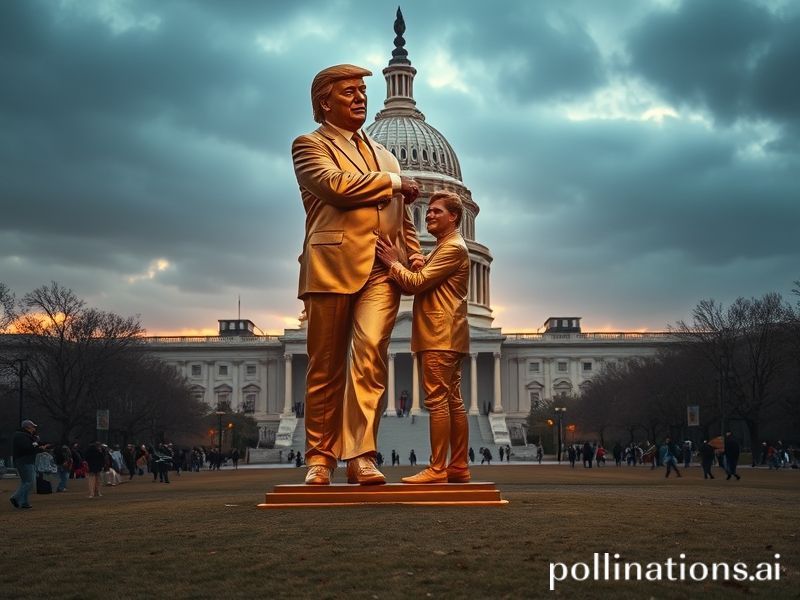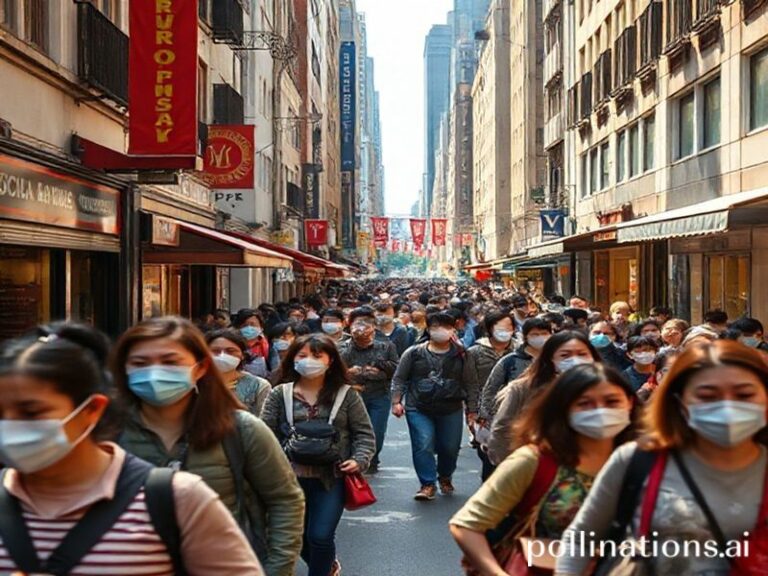World Reacts to Trump-Epstein Statue on National Mall: America’s Newest Cultural Export Is Pure Cringe
Washington, D.C. – In what diplomats are calling the most diplomatically radioactive unveiling since Chernobyl, a bronze statue depicting Donald Trump and Jeffrey Epstein locked in what the sculptor insists is a “power handshake” (though it looks suspiciously like a failed arm-wrestling match) appeared overnight on the National Mall. The piece—titled “Two Titans of Palm Beach” by an anonymous artist whose previous work includes “Dictator Selfie Sticks”—was bolted to the pavement at 3:07 a.m. local time, presumably to avoid the usual D.C. traffic of lobbyists, tourists, and bewildered pigeons.
Within minutes, the statue achieved what decades of bipartisan outreach could not: simultaneous bipartisan outrage. Republicans denounced it as “a libel in bronze,” Democrats called it “too accurate,” and the Secret Service simply requested its own hazard pay. Meanwhile, the rest of the planet watched the livestream with the same morbid fascination usually reserved for Formula 1 crashes or British cooking shows.
Global reaction was swift and mercilessly on-brand. The French foreign ministry issued a statement lamenting “a tragic misuse of patina,” while the British embassy tweeted a GIF of a monocle dropping into a cup of tea. German analysts noted the statue’s “impressive negative charisma,” a term previously reserved for the Eurovision entry from Moldova. Over in Moscow, state television devoted a full hour to the installation, concluding that “at least our statues commemorate people who are merely dead, not merely cancelled.”
In Beijing, the Global Times ran an op-ed headlined “America Invents New Form of Soft Power—Self-Immolation,” arguing that the statue is an ingenious psy-op to exhaust the world’s supply of eye-rolls. Tokyo’s Nikkei calculated the precise GDP loss caused by every Japanese salaryman simultaneously muttering “Yamete kudasai” at their phones, a figure that economists have tentatively labeled the “Cringe Index.” Even the Vatican weighed in, observing that the piece “raises urgent theological questions about the eighth circle of public relations.”
Of course, the international legal community scented billable hours the way sharks smell chum. The Hague politely inquired whether “unauthorized monumental trolling” qualifies as a crime against humanity, while Interpol considered adding “mystery sculptors” to its most-wanted list, right between wildlife traffickers and people who recline airline seats fully. The statue’s manifesto—QR-coded to a burner phone in the Seychelles—claims it is a commentary on “the commodification of scandal,” which is ironic coming from a piece that is already for sale as an NFT in five different time zones.
Back on the Mall, the scene resembled a hastily convened G-20 summit of street performers. One activist dressed as Lady Justice kept photo-bombing tourists, scales tipped with dollar-store coins. A delegation of Australian backpackers attempted to play cricket using rolled-up indictments as bats, while a lone Canadian politely apologized to the statue each time he walked past. By noon, the concession stands had pivoted: “Epstein-Island Iced Tea” and “Golden Handcuff Sundaes” sold briskly beside MAGA-red snow cones labeled “Fifth-Amendment Flavor—You Have the Right to Remain Chilly.”
The deeper significance, if one insists on finding any, is that the stunt weaponizes America’s most successful export: its own self-inflicted spectacle. From the souks of Marrakesh to the subways of Seoul, citizens now measure their domestic scandals against the U.S. premium tier. Italian corruption feels almost quaint, South African load-shedding downright practical. As one Kenyan pundit remarked, “When America sneezes, the world checks Twitter—and catches whatever moral variant is trending.”
By dusk, city workers had draped the statue in a black tarp printed with the words “Under Legal Review,” which promptly became the most Instagrammed object in D.C. after the Washington Monument. The sculptor remains at large, presumably updating their LinkedIn to “Conceptual Provocateur, Open to Relocation.” And somewhere in the ether, soft-power consultants are already pitching the next client: “Sir, have you considered a bronze diorama of yourself with [redacted]? It’s practically diplomatic Ambien.”
Conclusion: In the end, the statue will be removed, the tweets will be archived, and the pigeons will find fresher targets. But for one fleeting moment, the world was treated to a rare moment of global unity—everyone, from Lagos to Lisbon, could agree on a single truth: only America could turn the International Mall of Shame into an actual mall, complete with food court and commemorative spoons. And that, dear reader, is the sort of soft power no tariff can touch.







